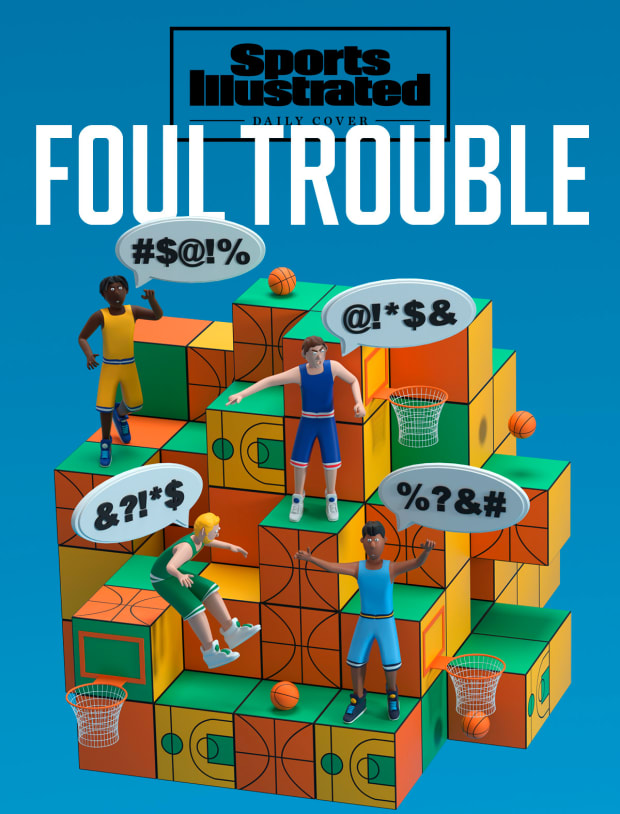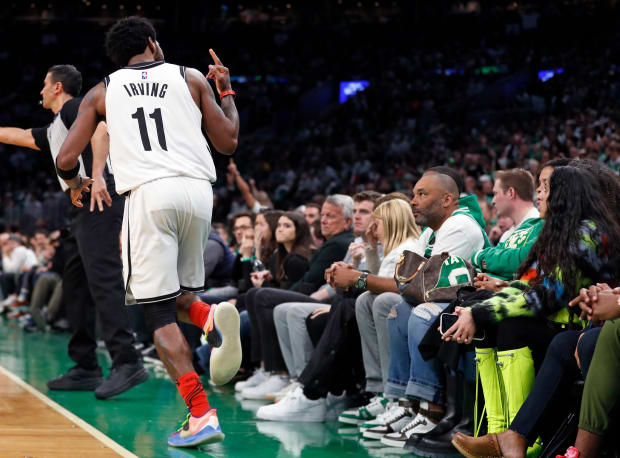Editor’s note: This story contains explicit language. Sports Illustrated typically censors profanity and vulgar language but is making an exception due to the subject of this story.
Sometime in the last year, NBA executives noticed something alarming—like, really fucking alarming: press conferences peppered with profanities, f-bombs flying freely. S-bombs and other assorted bombs, too. So before it could turn into a full-blown shitstorm, the league decided to act.
Memos were sent, warnings issued, fingers wagged. The message? Curtail the cursing, or pay the price for your impudence. Then came the fines.
Knicks forward Julius Randle was hit for $25,000 in early January, for saying (twice) that he wanted his critics to “shut the fuck up”—an “egregious use of profane language,” according to the league’s statement. The next week, Nets star Kevin Durant was hit for $15,000 for calling the schedule “fucked up”—a quote the league deemed merely “profane,” though clearly not egregious, given the lesser fine.
In April, it was feisty Timberwolves veteran Patrick Beverley who was docked $30,000 for a dual infraction: first, boasting to reporters, “I fucking told y’all” on the night Minnesota made the playoffs; then taking to Instagram to tell the Clippers (his former team), “Get the fuck out of here.” The league called this one-two punch both “inappropriate” and “egregious.”
Then came Jazz star Rudy Gobert, who in a live TV interview dismissed his team’s skeptics with a terse, “Fuck the talk”—and was nailed for $25,000 by league officials, who were obviously in no mood to pardon his French.

Illustration by Carlo Cadenas
The clear lesson? When it comes to excessive expletives, the league isn’t, ahem, fucking around.
All told, players have put at least $95,000 in the NBA’s swear jar this season—the most for any season in the last two decades—and there are still another six weeks of playoffs to go. Many more players have been warned or fined privately—even for quotes in print publications—as part of the NBA’s new war on wickedness.
“We gotta be better,” Byron Spruell, the league’s president of league operations, tells Sports Illustrated. “This is about league standards and making sure we have the right look and feel and demeanor to our game, on and off the court.”
This isn’t about FCC rules, Spruell says, though some of the offending quotes did get broadcast. It isn’t necessarily about protecting young ears from naughty words, he says, nor an attempt to police player emotions or player expression.
Spruell says it’s simply a matter of “decorum,” a word he invokes often in explaining the policy. “The league just has standards that we have to uphold,” he says.
“We get the emotion,” Spruell says. “We get the sort of element of authenticity. We’re not trying to take that away in any of this around the game, and their expressions on and off the court. But at the same time, we do have standards that we wanted to come back to and message very hard this year.”
He insists, “We’re not trying to be Pollyannish about this at all.”
Bullshit, says Michael Adams, the author of In Praise of Profanity.
“It’s just not the case that you can really blot profanity out of speech,” says Adams, a professor of English at Indiana University. “And certainly people have tried for hundreds of years. And it hasn’t worked.”
Profanity, Adams says, is simply a “natural element of language”—a useful tool for the moments we require “those expressive extremes.”
“Is it worth regulating for the NBA?” Adams asks. “Maybe if it makes business sense for them, because they need a certain decorum to make a certain amount of money. But in the broadest sense, in the 21st century, is it worth worrying about? My answer is no, it’s not. You’re not going to save my kids from profanity, NBA, by making sure that your players don’t use it.”
Indeed, studies generally indicate swearing has “no measurable negative impact on those who are exposed to it, whether they’re adults or kids,” according to Ben Bergen, a professor of cognitive science at UC San Diego and the author of What the F: What Swearing Reveals About Our Language, Our Brains and Ourselves.
And though foul language may put off some older fans, Bergen says his students consider it, well, not a BFD.
“Young people globally don’t care about profanity,” says Bergen, who conducts an annual poll of UCSD undergraduates (“admittedly a very skewed sample”). “At least among them, the word fuck is now in the mid-20s of most offensive words. It’s almost all slurs at the top. Shit I don’t think even cracks the top 50. So it’s not younger U.S. viewers they’re looking to win over by banning swearing.”
Swearing is now a staple of cable television and streaming services—to the point where the sanitized shows of broadcast TV seem almost quaint by comparison, Adams says. Fuck was viewed as “a really offensive and sort of dangerous word” through the 20th century, “and into the 21st, it just isn’t anymore.”
“Television production companies,” Adams says, “clearly understand that differently from the way the NBA executives are understanding it.”
The league will eject and even ban fans who use offensive or derogatory language at games. But there’s a distinct irony in fining its players for cursing while thousands of Boston fans were free to chant “Fuck Kyrie” at a game last month, or while thousands of Toronto fans were free to taunt 76ers star Joel Embiid with chants of “Fuck Embiid.”
The league calls the profanity crackdown part of a broader effort to reinforce decorum in all facets of the game. Officials noticed the spike in public swearing over the two pandemic seasons, along with an increase in aggressive language and behavior on the court—sometimes player vs. player, sometimes player vs. referee.
With no fans in arenas for the 2020 “bubble,” or through much of the 2020–21 season, standards across the board seemed to erode a bit. There was even an uptick in balls kicked into the (empty) stands.
With a return to normalcy (and full arenas) last fall, the NBA decided it was time for a “recentering” of their “respect for the game” rules, Spruell says. Technical fouls were up significantly this season as part of that effort. So were penalties for kicked or thrown objects.
The fines for public cursing set a modern record of sorts, with as many this season (four) as in the prior four years combined. In fact, there were more profanity penalties this season than in any single season going back to 2003–04—the earliest for which the league provided data. (These figures exclude penalties for other types of offensive language, such as racial or anti-LGBTQ slurs.)

The league has also issued multiple warnings or fines privately—“in the teens,” per a league official. Among those said to be on that list, according to a source: Nuggets center DeMarcus Cousins, who was put on notice after using multiple profanities (including fuck, shit and bullshit) in an April interview with Andscape—quotes that appeared only in print, not on video or audio. And although the NBA has not yet begun policing the players’ own podcasts, league officials won’t rule it out in the future.
Simply put, the NBA does not want players cursing in any setting—not on TV or on their IG, not in the rain or while they train, not with a computer mouse, and presumably not with Danuel House.
“We want to have a look and a feel that’s professional,” Spruell says. “So to ask to take those words out? I think that’s an OK ask.”
Spruell conveyed that message directly to players, coaches and other team personnel in a Dec. 2 memo, advising them, “Under league rules, team employees should be respectful in their communications, and refrain from using profane or objectionable language or gestures.”
But the crackdown has raised concerns for officials with the National Basketball Players Association, who say they were never consulted on the matter. Targeting quotes from off-air interviews, as in the Cousins case, was perhaps even more alarming. Union officials also note that the collective bargaining agreement contains no specific prohibition against foul language.
The union’s stance might best be summed up as GTFO (Get The Fines Out of here).
“Players showing emotion by cursing or using other strong language is not new and is something that will continue to naturally occur, considering the intensity and extremely high level of competition in our league,” the NBPA said in a statement. “We’re currently discussing these matters with the league and hope to gain some clarity and resolution both with respect to the discipline already imposed and the issue in general going forward.”
Exacerbating the league’s concerns: The evolving state of media and social media. Newer outlets like The Athletic and many independent platforms freely print profanities in full, rather than dashing them out (“f ---”) or replacing them with parentheticals (“Get the [expletive] out of here.”), as most mainstream newspapers and magazines did for decades (including Sports Illustrated, which still uses this practice). The quotes then get disseminated on Twitter and Instagram, increasing the impact exponentially—and making league officials all the more queasy.
“Certainly that evolution has some context to it and some impact on how we’re thinking about it, as well,” Spruell says.
Warriors star Draymond Green, one of the league’s most outspoken and candid players, says he understands the NBA’s concerns. But he’s not convinced fining players is justified.
“You have to understand that sometimes there are emotions, and understand that we aren’t robots,” Green says. “When something’s overboard or malicious, all right, tamp down on that. But if a guy is in the flow of talking and a curse word comes up, you can’t fine the guy for that—well, you can if you want. But I don’t necessarily agree with that.”
He also questions whether fines even work. After being docked $25,000 for flipping off fans in Memphis last week, Green practically laughed off the penalty, saying, “I make $25 million a year. I’ll be just fine.”
Warriors vet Andre Iguodala, who serves as first vice president for the NBPA, says he sees both sides of the issue—the need for players to express themselves authentically, and the league’s concern about the manner of that speech.
“It’s all about protecting their image, I guess,” he says.

Jim Davis/The Boston Globe/Getty Images
So, what qualifies as obscene in the view of NBA officials? Like Justice Potter Stewart, they know it when they see it. Any version of fuck—“one of those magic words,” Spruell says—is almost an automatic penalty. Other profanities, like shit, bitch and ass, will often be overlooked, unless a player goes overboard in a single session. (Coaches and team executives are subject to the same standard, although none have been publicly fined since 2015, when Raptors exec Masai Ujiri was dinged $35,000 for saying shit at a fan rally, his second offense in a 12-month span.)
All of these matters are considered and adjudicated by Spruell’s office, with Commissioner Adam Silver providing the final judgment, if necessary.
The league says it judges each situation independently. Suns star Chris Paul, for instance, was not fined for using fuck in a tweet this week, presumably because he was reacting to the harassment of his family members at a game in Dallas. Nets star Kyrie Irving was fined $50,000 in April for directing obscene gestures and language at Boston fans, but the league chose not to fine him for then repeating the fans’ alleged taunts—which included fuck and bitch—during his postgame press conference. The league could have docked him up to another $50,000 for doing so, the maximum permitted by the CBA.
League officials stress they don’t expect to eliminate the f-bombs and s-bombs entirely. They just hope to make them a little less frequent—a goal that Bergen, the UC San Diego linguist, believes is both pointless and unlikely.
“Punitive approaches to managing language usually backfire,” Bergen says. “Telling an adult that he can’t use a word—especially an adult who is used to being a leader and using that word in his job—is unlikely to engender acquiescence. They just learn that if they’re going to use that word, to get their money’s worth.”
Indeed, players know the consequences before they rip referees or curse in a press conference, and they do it anyway. Sure, they know it’s against the rules and perhaps not the ideal image to project. But sometimes, in the moment, they just don’t give a fuck.







